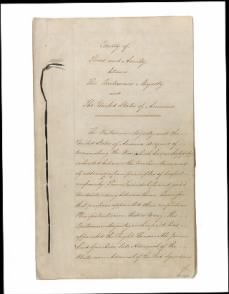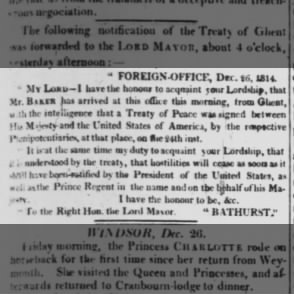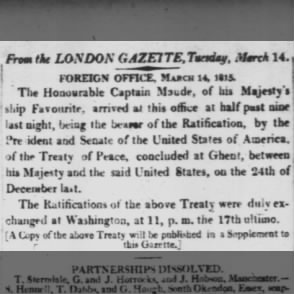

This month marks the 200th anniversary of the end of the War of 1812. The hostilities formally ended on February 17, 1815, at 11 p.m., when President Madison exchanged ratification documents for the Treaty of Ghent with a British representative.
Although both countries had been exploring the possibility of peace since almost the beginning of the war, official peace negotiations didn’t begin until August 1814 in Ghent, Belgium. The American delegation was made up of some of the best America had to offer: John Quincy Adams, Henry Clay, Albert Gallatin, Jonathan Russell, and James A. Bayard. Britain, on the other hand, sent lesser-known diplomats, reserving its stronger players for the Congress of Vienna, which began around the same time and addressed European issues following Napoleon’s initial defeat.

Although the two delegations came to the table with many issues to negotiate, in the end the treaty avoided virtually all those subjects—as well as the grievances (such as impressment and restriction of neutral trade) that had caused the war in the first place. Leaving to future resolution nearly all issues the two sides disagreed on, the treaty only really ended hostilities and gave each nation back whatever territory it possessed at the beginning of the war. Neither side emerged a clear victor in the negotiations.
The British and American representatives signed the treaty on December 24, 1814, and the British government ratified it a few days later. However, although the Treaty of Ghent was signed in December, news traveled slowly to the Americas, which meant that some battles—most famously the Battle of New Orleans—were fought after the treaty was signed.

A month and a half after the British ratification, the treaty finally made it across the ocean to the United States, and on February 16th, the Senate unanimously ratified the treaty. Madison approved it later the same day and then exchanged ratifications with the British on the 17th, ending the war.
Interested in the War of 1812 or have ancestors who served in it? Explore Fold3’s War of 1812 collection, including pension application files and service records.
What about the soldiers that fought in the Battle of St. Mary’s on February 24, 1815? The British sent seven barges of marines up the St. Mary’s River, hoping to make one last stand. They ran into patriots from the Georgia side and Florida. My ancestor fought with these patriots, but after his widow made repeated attempts to obtain a pension, was refused.
My 5 x’s great grandfather lost his life at EMUCFAU Creek Alabama in 1814 in the war against the Indians….I have searched for years and to date have not found any reference as to where his body was buried…
what was your ancestor’s name?
My 5 x’s great grandfather lost his life at EMUCFAU Creek Alabama in 1814 in the war against the Indians….I have searched for years and to date have not found any reference as to where his body was buried…
It is a good thing that Gen Andrew Jackson decisively won the Battle of New Orleans as the commanding British General had orders from his government to disregard any treaty signed between the US and Britain and to take all of Louisiana. A little known historical fact that should be taught in our schools, but then too, few read real history. If the British had won, the Louisiana Purchase would have been null and void.
Thank you for your service. In addition, just the same with our current administration, if they are allowed to continue, our once great country, will not survive. Therefore a means to an end should be at hand. God bless.
My 4th great grandfather served as corpral in Capt John Fleming’s Ohio Milita.
Was curious if there were records for Milita service.
Check for his name in War of 1812 records. All kinds of things recorded int 3 x 5 cards.
My 3rd great grandfather Josiah Mott also served in Ohio Militia
With what ship with and what master did the negotiators from America travel to Ghent?
My 4th great grandfather William Shay born in 1796 in Lock Port NY . Is buried along with his son Otis in Terra Haute Illinois. William as a veteran of the war of 1812, Otis as a veteran
Of the Civil War.
Visit Sulgrave Manor, an hour north of London, to celebrate George Washington’s ancestral home. His 7xgreat-grandfather, Laurence Washington, bought the property from Henry VIII ! It has the largest collection of Washington memorabilia outside the U.S. and is a lovely 15th c manor house and gardens. It represents 200 years of peace between Great Britain and the U.S. since the signing of the Treaty of Ghent.
What a pile of hooey.
The War of 1812-1815 was pure and simple an American war of aggression against a weak British army in North American when the British were tied down fighting the French dictator in Europe.
The boarding of AMerican ships was merely a pitiful excuse. The Americans did the same thing to the British during their Civil War.
Get real!!!
The first Congress, which convened in 1790 had a big problem. Since shipping was a great part of the economy the practice of leaving sailors behind at any convenient port if they became ill or injured was a leading to unrest. The Congress addressed this by legislating “Obamacare” for our merchant marine. Ship owners were made responsible for caring for and bringing home sick or injured sailors. Word of this got around, and eventually British navy sailors would desert at any foreign port where an American merchantman or whaler was also stopping in order to enjoy this benefit. This grew to such an extent that it interfered with the British navy’s operations, and they took to stopping US ships at sea and impressing any sailor they wanted.
During the Civil War, confederate privateers used the British navy’s base at Portsmouth as their headquarters.
I feel sorry for you Hal .You need to know your history . Did you ever serve our great country in the military – I doubt it .
Finally! Someone actually knows the truth. Thank you Hal!
I do not have a website that is why I realy on my email.
Thank You Vicki
No wonder both sides believed they had won the war!
The more depth I have in search my ancestor’s the more of our ancestors I find have fought in many battles/wars since and before the Revolutionary War. My husband is a direct descendant of his great great grandfather Spencer Coleman (Rev.War) and his great grandfather William Knox Coleman (war 1812). the more I explore our various branches of our Tree (Meek-Cook and Coleman-Watson) the more I find from the Civil War, World War I, World War II, Korean, Viet Nam, the first Gulf War, the war in Iraq and beyond. I need to find a way to post each and ever on under the conflict or war that they served in, and hopefully, the branch they served under, and their company if I have it.
I’ll fight anyone, anywhere, anytime! That’s the way I roll.
This was an unusual war because of the slow method of passing on information. My birthplace was Niagara Falls, NY Over the years, I have visited Fort Niagara which played a major part of the war. I visited it 2 years ago and it was just as interesting as the many times I visited.
My 5th. great grandfather served in the war he was Pierre Achille Rivery, capt. firt batallion of volunteer of New Orleans LA.